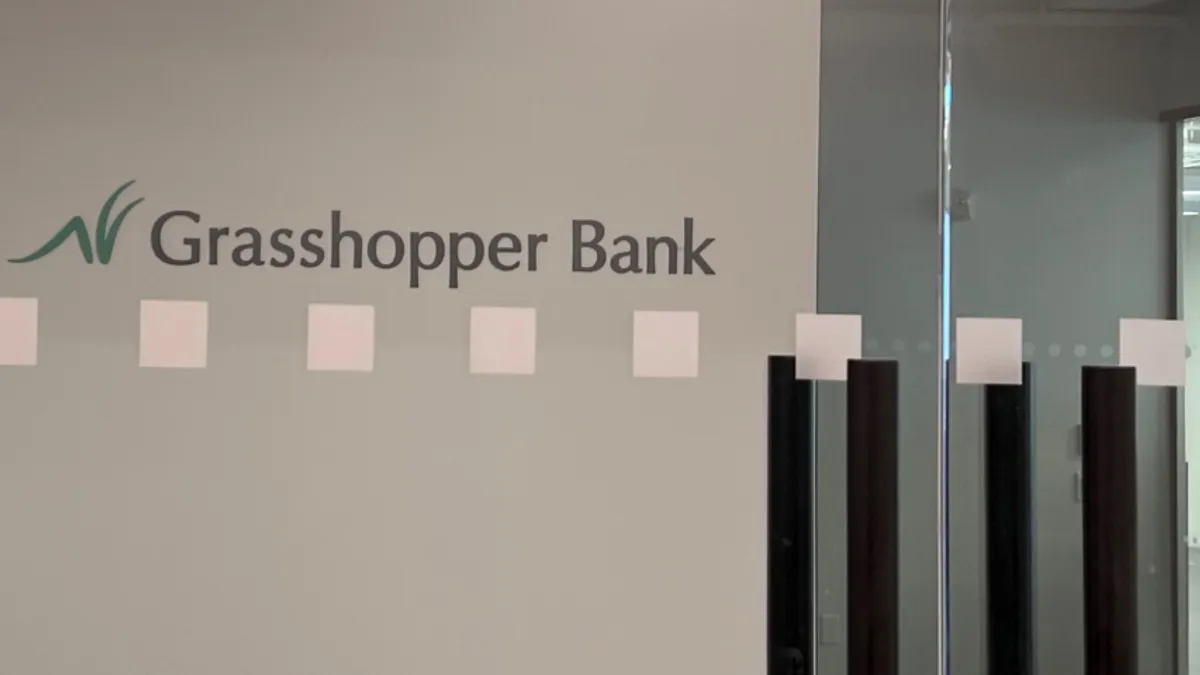Dive Brief:
- New York-based digital lender Grasshopper Bank has agreed to acquire Dearborn, Michigan-based Auto Club Trust, a federally chartered savings bank, in a cash and stock transaction, the companies announced Tuesday.
- The deal would create a financial institution with roughly $1.4 billion in assets and establish Grasshopper Bank as the “exclusive” provider of certain depository and lending services to over 13 million AAA members within ACT’s parent company, The Auto Club Group. ACG is one of the largest AAA clubs in North America, according to the press release.
- The transaction — expected to close in the first half of 2025 — has been approved by the boards of both companies but awaits customary closing conditions, including regulatory approvals. Financial details of the deal were not disclosed.
Dive Insight:
“We surely, from a company perspective, want to move beyond just serving the business and innovation economy and expand naturally into a consumer product space. And this opportunity to partner with ACG and ACT, the banking subsidiary, allows Grasshopper to take that next step in a fairly significant way,” Grasshopper Bank CEO Mike Butler told Banking Dive Wednesday.
As part of the transaction, the nearly $495 million-asset lender ACT will be dissolved. Grasshopper will raise $35 million in new equity and issue ACG a 4.9% ownership stake in Grasshopper of approximately $7 million – bringing a total of $42 million to the table, according to Butler.
The merger aims to leverage “Grasshopper’s capabilities and resources to grow the reach of our financial services,” Joseph J. Richardson, CEO of The Auto Club Group said in a statement Tuesday.
The partnership provides the $835 million-asset Grasshopper exclusive access to 6 million households and strengthens the lender’s position in digital banking through commercial, small business, and consumer product offerings digitally under the AAA brand, Butler said.
“It'll look and feel like AAA with Grasshopper behind the scenes. It is an advancement of our kind of strategy around white-label solutions and even a little bit of advancement around banking-as-a-service,” he noted. “This is banking-as-a-service, not to a technology company, but to a fairly large brand that wants to provide banking services.”
Typically, BaaS is a business model that allows licensed banks and fintechs to provide banking infrastructure, products, and services to other businesses through the banks’ or fintechs’ own applications.
“So, the evolution of the partnerships between companies and fintechs and banks make for a really good strategy of how banks can grow their customer base,” Butler said.
Grasshopper Bank’s application programming interface-enabled embedded finance platform allows fintechs and brands to offer financial services, including Federal Deposit Insurance Corp.-insured deposit accounts and payments services, to their end clients.
“This industry is evolving,” Butler said. “I mean, I'm not JPMorgan, I'm not Bank of America,” he continued, “and I can't be there, but I can work within the niche opportunities that are growing as the industry evolves.”
The deal would also result in a 48.5% accretion to Grasshopper’s tangible book value at close, the company said.
Butler, a former president of consumer finance at KeyBank, noted that Grasshopper wants to keep an open-door policy for its employees like his previous company, KeyCorp, when it expanded through mergers and acquisitions. However, there will be some expense reductions to eliminate duplicate technology and backroom offices as part of the merger.
“We need people to grow, so we're going to grow, and I want to make sure everybody's offered an opportunity to be a part of our growth story. We like to give people choices,” Butler said.















